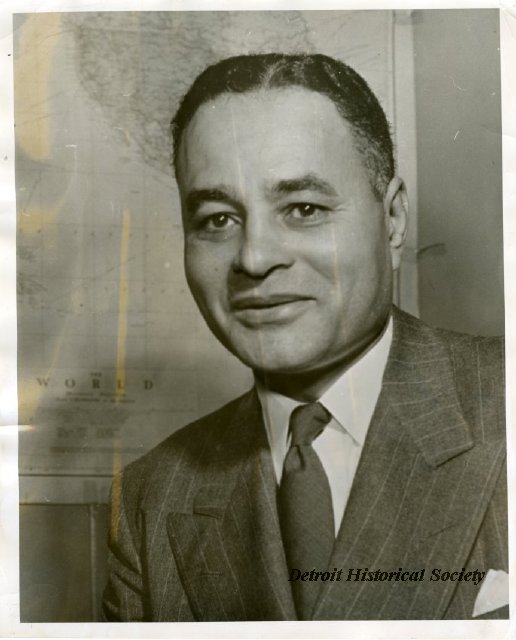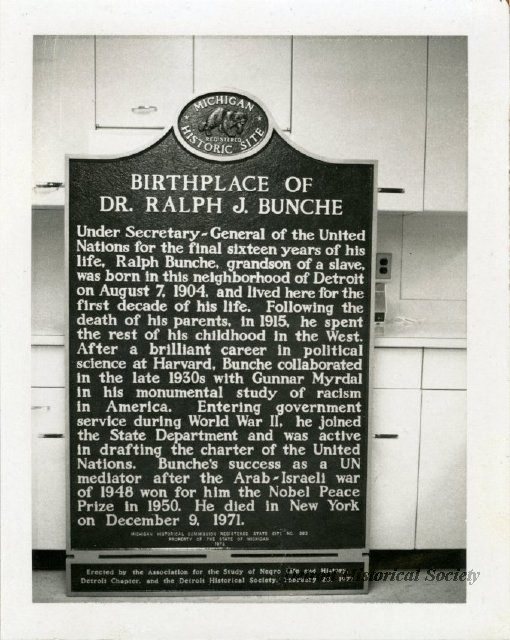Detroit has been home to championship sports teams and platinum record-selling musicians, but did you know we were home to a Nobel Peace Prize Laureate? In 1950, Detroit-born Dr. Ralph J. Bunche was awarded the Nobel Peace Prize for negotiating a series of armistices between Israel, and its neighbors Egypt, Jordan, Syria, and Lebanon. He was the first African-American--and first non-white person--to be recognized by the award committee. The award was but one part of the fascinating life of this often-overlooked Detroiter.
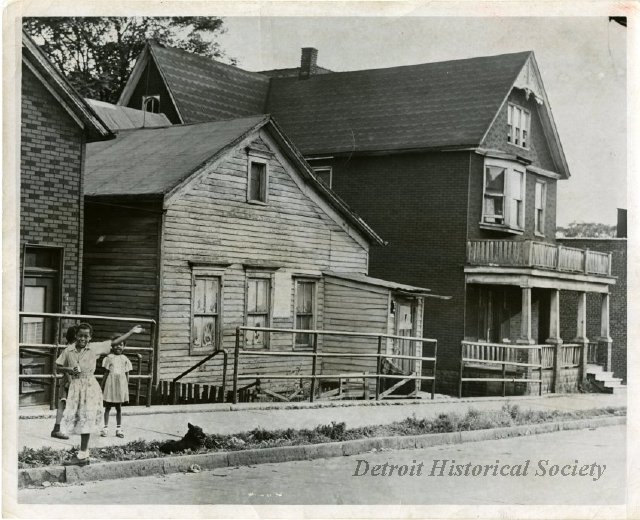 The wooden house on the left stood at 1822 Macomb Street and was occupied by the young Ralph Bunche and his extended family during part of his childhood. The house is pictured here in the early 1950s. The house no longer stands, and the plot on which it stood on is now part of the Dequindre Cut.
The wooden house on the left stood at 1822 Macomb Street and was occupied by the young Ralph Bunche and his extended family during part of his childhood. The house is pictured here in the early 1950s. The house no longer stands, and the plot on which it stood on is now part of the Dequindre Cut.
Bunche was born around 1904, the son of a barber and an amateur musician, in a home at 434 (now 5886) Athon Street in Delray. The family moved around, living at Monroe Street between Dequindre Street and St. Aubin Street, and, in 1910, on Macomb Street between Orleans Street and Dequindre, as well as spending some time in between in Ohio and Tennessee where his father briefly sought work. Detroit city directories fluctuate between listing Ralph’s father Fred, his mother Olive, his maternal grandmother Lucy Taylor Johnson, and his aunt Ethel Johnson, and his uncles Charlie and Thomas as residing at these addresses from year to year. While Fred sought work as a barber, Ethel helped support the family as a hairdresser and manicurist. Charlie and Thomas worked at the Diamond Match Company. His grandmother Lucy was the family matriarch; in 1969 Ralph penned a touching tribute to her in Reader's Digest attributing his achievements to her influence . Around 1914 or 1915, Ralph departed for Albuquerque, New Mexico along with this mother, father, grandmother, younger sister Grace, and his uncle Charlie, and in 1917, he again moved to Los Angeles. With the encouragement of his grandmother, Bunche attended the University of California, Los Angeles. He emerged as valedictorian with a degree in political science. Bunche then continued his academic career across the country earning a Master’s Degree and Doctorate from Harvard, specializing in French colonial policy, while also teaching at Howard University. He holds the distinction of being the first African-American to be awarded a doctorate in political science. His studies took him to Africa where he observed the effects of colonial policy. Back at home in America, he worked on the issue of segregation by founding the National Negro Congress at Howard. He also traveled the South to conduct an important series of interviews on segregation with sociologist Gunnar Myrdal. Just prior to the outbreak of World War II, Bunche’s expertise with colonial regions secured a position for him at the Office of Strategic Services as an analyst. During the war, Bunche distinguished himself, resulting in a transfer to the State Department. As World War II came to a close, Bunche was poised to become a major architect of the post-war world. Bunche was among the representatives from the United States who took part in the international conferences which birthed the United Nations. He was considered a key contributor for the body’s Universal Declaration of Human Rights, as well as its Trusteeship Division, which was created to provide a path of decolonization for nations. He left the State Department to join the United Nations and head the Trusteeship Division.
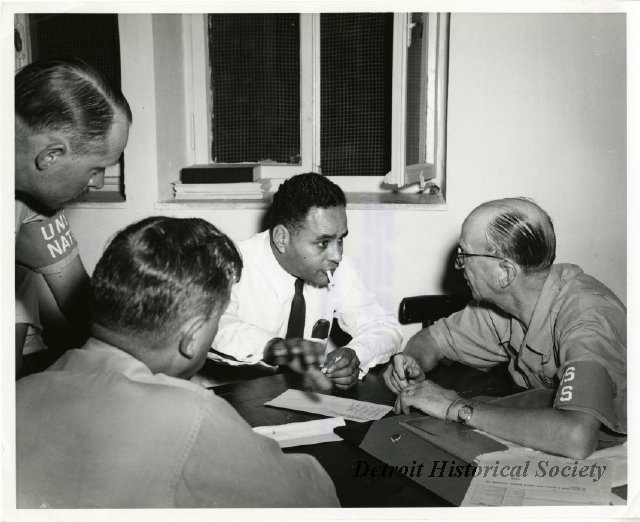 Bunche is pictured here meeting with General Åge Lundström, United Nations Chief Military Observer, in Haifa during the 1948 Arab-Israeli War.
Bunche is pictured here meeting with General Åge Lundström, United Nations Chief Military Observer, in Haifa during the 1948 Arab-Israeli War.
In 1947, Bunche was assigned to work as part of a United Nations committee to explore the thorny issue of the borders and sovereignty of Palestine and the recently established nation of Israel. Despite the efforts of the committee, the adopted plan of partition was not accepted by the region’s neighboring nations. The 1948 Arab-Israeli War followed. The United Nations sent diplomat Count Folke Bernadotte to mediate with Bunche as his assistant. As tensions flared, assassins ambushed Bernadotte’s motorcade, killing the count. While Bunche too was an intended target, a series of delays had left him stuck at a checkpoint and out of harm’s way. Following Bernadotte’s death, Bunche took the helm of the negotiations. After a fresh series of draft proposals and much hard work, Bunche managed to arrange an armistice between Israel and Egypt. He repeated his feat three more times, with Syria, Lebanon, and Jordan. Bunche had not only stopped a war, but also helped to establish the authority of the new United Nations.
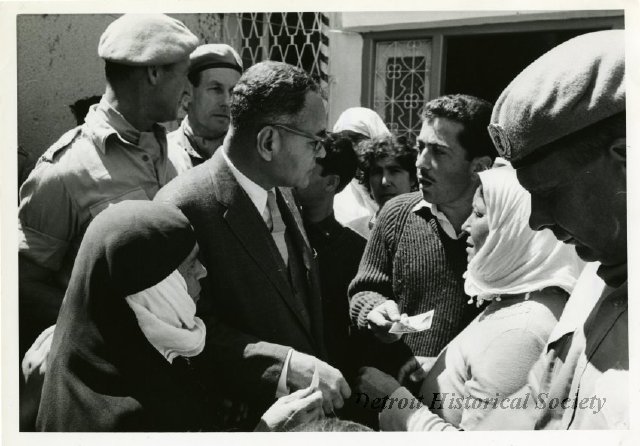 Under-Secretary Bunche and several members of the United Nations Peace-Keeping Force in Cyprus meet with residents of Ktima on April 9, 1964.
Under-Secretary Bunche and several members of the United Nations Peace-Keeping Force in Cyprus meet with residents of Ktima on April 9, 1964.
It was for these efforts that the Nobel committee chose to honor Bunche with the 1950 Nobel Peace Prize. In his acceptance speech, Bunche described himself as “but one of the cogs in the United Nations,” and praised the work of his predecessor, Bernadotte. His humility in accepting the award was tempered by his belief that the armistices were merely the initial steps toward establishing lasting peace in the region, and that, as he told Psychology Today in a 1969 interview, “Peacemaking at the U.N. is not done for prizes.”
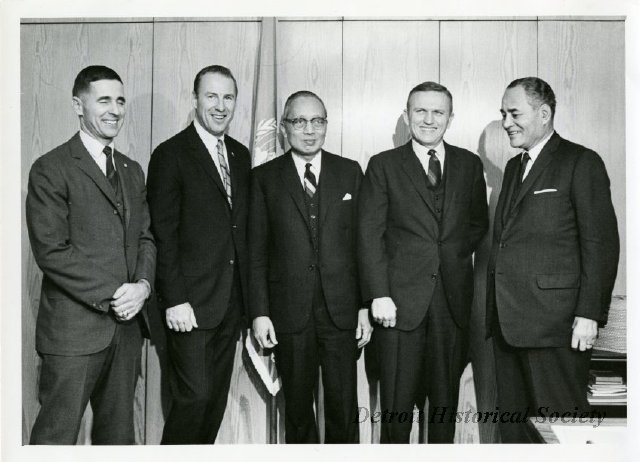 Under-Secretary-General for Special Political Affairs Bunche (left) and United Nations Secretary-General U Thant (center) meet with the astronauts of the Apollo 8 mission on January 10, 1969. Of his time with the astronauts, Bunche commented to Psychology Today in a 1969 interview, “Perhaps the conquest of space will liberate our minds from the provinciality of being earthbound.”
Under-Secretary-General for Special Political Affairs Bunche (left) and United Nations Secretary-General U Thant (center) meet with the astronauts of the Apollo 8 mission on January 10, 1969. Of his time with the astronauts, Bunche commented to Psychology Today in a 1969 interview, “Perhaps the conquest of space will liberate our minds from the provinciality of being earthbound.”
Bunche continued his work for the United Nations as Under-Secretary for Special Political Affairs, working toward peace in conflicts including the Congo Crisis, the Suez Crisis, continuing tensions in the Gaza Strip, and internal violence in Cyprus. The newly-minted Nobel Laureate even took the time to return to his childhood home to attend the opening ceremony of the Detroit Historical Museum in 1951. Despite long suffering problems with his legs which had been further compounded by age, Bunche joined Dr. Martin Luther King, Jr. in the march to Selma in 1965. In 1968, Bunche accompanied the civil rights leader again, this time as part of King’s funeral procession. Bunche himself passed away on December 9, 1971.
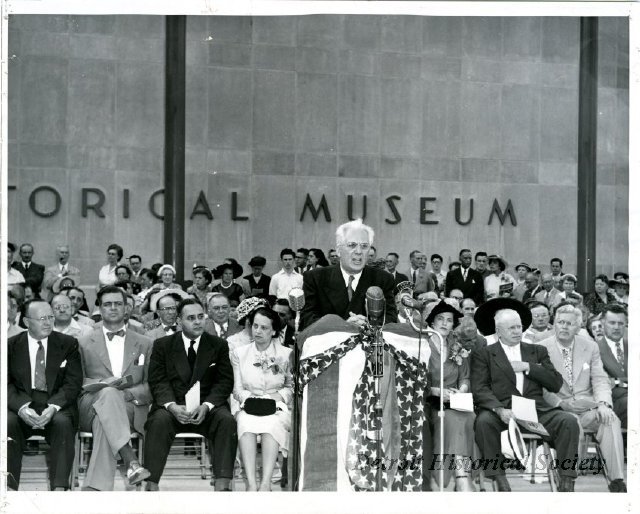 Bunche is pictured here seated between his wife, Ruth H. Bunche, and Michigan Governor G. Mennen Williams, at the dedication ceremony for the Detroit Historical Museum on July 24, 1951.
Bunche is pictured here seated between his wife, Ruth H. Bunche, and Michigan Governor G. Mennen Williams, at the dedication ceremony for the Detroit Historical Museum on July 24, 1951.
Following Bunche’s death, the Detroit Historical Society and the Detroit chapter of the Association for the Study of Negro Life and History honored his memory with a plaque at his birthplace on Athon Street. While the plaque is no longer in place, Bunche’s memory is kept alive through the Ralph J. Bunche Preparatory Academy, located on Macomb Street, just several blocks from his other childhood homes in the city. Please visit our online collection for more information about Dr. Ralph J. Bunche.
